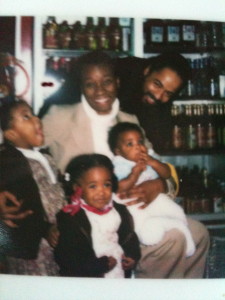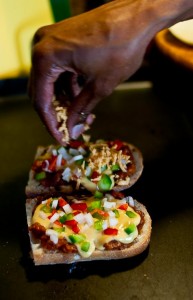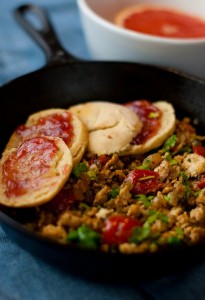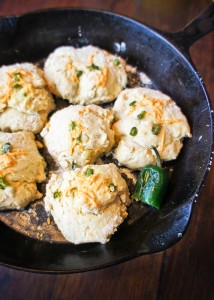We’ve often heard that soul food referred to, in the plant-based world, as the last chains of slavery, and always wanted someone to fully analyze this concept. Ayinde Howell takes the chicken shacks to task with this important piece of work;
You can have a life: culture without eating meat?!
About the prospect of having a vegetarian home, my boy told me once “I always pictured myself having a black life, you know’ BBQ’s and cookouts, family reunions etc…” But nowhere is it written that we cannot enjoy these same sacred traditions in a way that promotes longevity. My roots are in Alabama on my father’s side and Baltimore on my mother’s side. I think it’s important to mention here the social stigma of veganism especially in the black community. When my sisters and I were not allowed to eat at what everyone else was eating at the Easter dinners, Grandmas’ birthday, BBQ’s, and the family reunion cookouts, my parents were chastised. Parents and siblings thought it was just a phase, “It’s just chicken baby.” “Our food ain’t good enough for ya’ll?” “Those babies need some meat.” This radical new path of healthy living eventually caused my parents to go it alone and trips to grandparents houses and cousins houses became less frequent until not at all.

My father however, was not ready to entirely give up the traditions of his youth just because he and his wife decided to take their family in a new direction. I remember growing up in Tacoma, our small backyard was home to BBQ’s and burgers in the summer time and the kitchen was where collard greens skillet cornbread and mac & yease (my fathers version of Grandma Mary’s mac & cheese) adorned the small table in the winters. Having been raised vegan all my life I do not have the perspective of someone who converted to veganism. However, I can’t say I’ve never had a desire to see what the whole meat thing is all about. So I guess the most important thing I learned from my upbringing is the discipline it take to to stick to something you stand for even when you find yourself standing alone. Food is a very powerful thing in every community. The fact is what we eat defines who we are as a people. I do believe the main thing that was missing from my childhood was not meat but the community.
Eating from the Massa’s table. Trapped by Tradition.
In black American culture, our history has a heavy influence on what sits on our tables today.
Pigs feet, pig ears, chitlins, neck bone, fatback, hog mowls, cracklins’, chicken heads, etc. the worst parts of a dead animal that the master didn’t want was scraped off the table and left for the slaves. A collection of African people taken to form a free work force. Working to harvest America’s first major agricultural crops tobacco, wheat and cotton. During this time, slaves were forced to let go of African traditions and replace those with a completely new diet and way of life. Swapped out were many of the plant based meals and traditions and in their were a host of farm animals, saturated fats and fried preparation.
The beauty of our history as black Americans you can see the human spirit and the ideals this country was founded on at work. We persevere, we adapt and we celebrate our success. Soul food maybe the epitome of taking some of the most f’ed up lemons in this nations history and making delicious lemonade. My father learned how to cook from my grandfather Mr. Howell, known for his fried chicken. The secret passed along was essentially this; it is not the chicken or chitlins it’s how we seasoned it how the creative spirit and love that we put into to this subpar food and made our own delicacy. My father took those principals and ideals and applied them to living, whole, organic food for the mind, body and soul.
Garbage in. Garbage out.
I have always lived in the “hood” and in my area it’s always Chinese food and fried chicken or some other cheap highly processed “food” on every corner. I know first hand by not having access to food that is whole and organic, non-GMO non -MSG you are taking away the choice and creating a mentality that questions real orange juice and opt for the orange drink. If you look back over the years not much has changed for black and other low income communities from table scraps to government cheese to chicken nuggets the same message is sent through the food; you’re good enough to work and breed, but not good enough to live healthy long lives with your family.
There are 7 different kinds of steroid hormones currently approved by the FDA in beef alone. Most people will read this an say “I just can’t get full off vegetables” I need protein, etc. Tempeh, tofu and Seitan (wheat protein) have only a few percent less grams of protein per serving than chicken, steak and fish. And soy has almost double the iron content than chicken and beef. Consider this the animals you eat are not carnivorous animals they themselves are vegan. The best way to fatten up chickens pigs, and cows is to feed them more grains and grass. So if you cut out the middle mammal and go to the source, easy for me to say I know and I often tell people I teach cooking classes to is this; the bottom line is taste texture and emotional connection to the food we eat. My mother made fried tofu where maybe your mother made fried chicken and if someone told me to stop eating it I would probably tell them to go f’ themselves. But if the rest of the sentence was “If you make this change you will feel better, live longer, have healthier children, and reduce my carbon footprint thus doing my part to save the planet.” I would probably reconsider.
Blacks are plagued with maladies connected to their food.
I have never been one to preach but I also never been one to bite my tongue and the black community needs a wake up call for a group of people who literally built this country from the ground up not to enjoy the fruits of our free labor in arguably the best time to be black in American (Obama duh!). With fresh foods removed from the table and replaced with super processed, low cost alternatives, the health of our communities is becoming a reflection of that change. The numbers have skyrocketed for African Americans. Instances of heart disease, diabetes, and other obesity related illnesses are on the rise and now affecting a younger and younger demographic.
Diabetes
An ADA study shows Diabetes is major factor in related health problems like heart and kidney disease, 3.7 million African Americans aged 20 years or older have diabetes.
Heart Disease
The Office of Minority Heath says African American adults are more likely to be diagnosed with coronary heart disease, and they are more likely to die from heart disease. Although African American adults are 40% more likely to have high blood pressure, they are 10% less likely than their non-Hispanic White counterparts to have their blood pressure under control.
Obesity
According to The Department of Health and Human Services, African American women have the highest rates of being overweight or obese compared to other groups in the U.S. About four out of five African American women are overweight or obese.
Childhood Obesity
The DHHS also studied this growing epidemic and found African American and Mexican American adolescents ages 12-19 were more likely to be overweight, at 21 percent and 23 percent respectively, than non-Hispanic White adolescents (14 percent)
Asthma
Acording to the Mayo Clinic , one of the major ways to control asthma is to eat lots of fruits and veggies which may help reduce lung swelling and irritation (inflammation). A study by DHHS shows black children have a 260% higher emergency department visit rate, a 250% higher hospitalization rate, and a 500% higher death rate from asthma, as compared with white children. Children in poor families are more likely to ever have been diagnosed with asthma.
Often I see clients who are affected directly or have a parent or loved one that has one of the above diseases and have been told by their doctor that they need to change their diet drastically or deal with the consequences. Often times those repercussions means losing the ability to work or not seeing their small children grow up, and that’s when veganism becomes viable for people. Veganism is for the human longevity. I have nothing against vegans with an animals rights focus but I believe that once we are able to live healthy happy life that is also good for the environment, this will also aides animals as well. In short, if we can stop the cycle of suffering and killing ourselves maybe we will stop the cycle of killing.
Each one teach one
The economical and education divide keeps us ignorant to why we should be concerned with what goes into our body are because the machine is too busy selling us things to go on our body.
I was talking to a friend of mine who wants to learn more about veganism, but mentions that she can’t afford the organic stuff, “I ask her how much is your most expensive pair of shoes? You know the ones with the red bottoms that are about a months rent?”… Radio silence. The fact is we are conditioned to spend enormous amounts of money on material things to go on our body. But any more than the .99 menu is too expensive!? But it only takes common sense to realize you are what you eat. I’m not saying don’t look nice, nobody loves a woman in heels more than me, trust me.
Change starts on the one, my change is veganism and if somebody wants to know how to become vegan and live this life and be “normal” and social I can help. Baby steps. The first thing that has to happen is that we must train your taste buds to experience something different.
It all depends with a meal;
(Do these recipes above – all vegan – by Chef Ayinde – look anything less than delectable? Photos courtesy of Kate Echle of LeChouSauvage.com)
● If you can cook, commit to Meatless Mondays focus herbs and seasonings and experiment with tofu, tempeh, seitan and quinoa untill you are blue in the face, then do it some more. You have to find the textures you want and that only comes with time.
● Start a CSA in your neighborhood and have your kids help on the weekends. My mother kept us busy in the kitchen and the garden because she believed in the educational aspect of food math, science and biology in practical places.
● One spark starts a fire, be that spark in your community. Challenge the best cook at your church, college or job you to a top chef style cook challenge him/her to create from organic/vegan palate replacing animal protein can easily and equally replaced with plant based items like tofu, tempeh, seitan, and quinoa. Replace butter with a dairy free brand. The least processed the better.
● Search the web for popular meat free recipes and make eating healthy an event, a game night, a dinner party, a singles party (wink wink). Most alcohol is vegan, so feel free to add a little and loosen up the skeptics.
Understand that it will take time to change and moving away from something takes discipline (lot’s of it!) But if you can do the Daniel Fast, you can be vegan. Some easy replacements; seitan and tofu are the most accessible and a great substitute for chicken, swap in brown rice for white, or even use quinoa as your grain substitute. Dairy is always hard for people but soy and almond milk are great in cereal and baked goods. There is no egg yolk replacer, but there is a egg white replacer called Ener-g great for baking. Other simple switches include replacing your old salt with sea salt, making sure your foods are not GMO (GMO food have chemicals that eat away at the intestinal walls) invest in yourself by spending a little more on food than you may be comfortable with and see the difference. The most liberating freedom is freedom of choice — so choose a healthy body, a clear mind and a better home and all shackles will dissolve.

Ayinde Howell is a 4th generation entrepreneur, a life long vegan and vegan Executive Chef. His work has been featured in the New York Times, New York Magazine, Village Voice, Time out NY, and on BET’s top rated 106 & Park. Ayinde is currently creator and creative director of ieatgrass.com a lifestyle blog focused on plant based living and making it more assessable. The photos above are from an fourth coming digital cookbook by Chef Ayinde to be released this summer. (Ed’s note: ps, girls… this stone compassionate fox is single.)




